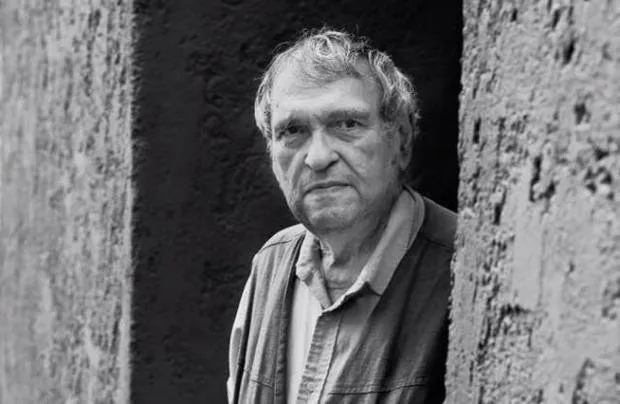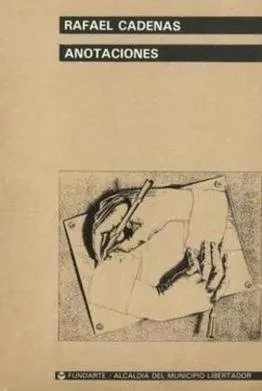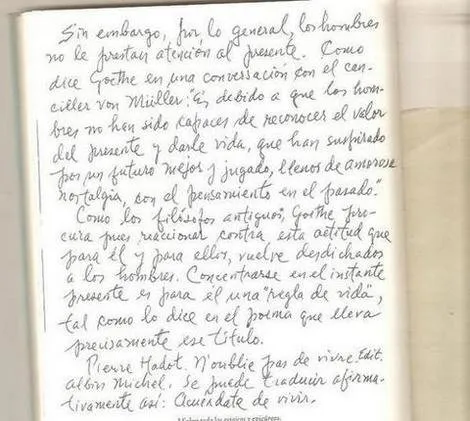Annotations or the vigilant consciousness of a poetic (Part I)

On other occasions I have published in this blog articles about the Venezuelan writer Rafael Cadenas, considered the most important living Venezuelan poet. Now I bring you a first part of another work on the same author, this time about his book Annotations, a collection of reflections related to life, poetry, language, among other aspects.
After making known several essays or notes, collected in journal articles or books, such as: "Literature and Life" (1970), Reality and Literature (1979), Cadenas publishes Annotations in 1983.
"Notebook", a fragmentary writing that deals with the fragmentation of the world, as he maintains in his book, Annotations purifies a thought and a saying that persevere in the same founding centre of his search, and in which the principles of one poetic other are made explicit.
He responds to that "acute vigilance", to that ethical urgency demanded of writing by Cadenas when he expresses: "Writing can only be today defending the privileges of life, threatened by man".
Manifestation of a consciousness that conceives writing as a need to say. Such vision of writing presupposes a vigilant consciousness of man and his relationship with reality, which leads Cadenas to notice the occurrence of a fall: "man must have lost, if he had it, the sense of mystery".
The nuclear in this warning is inscribed in the axis of the poetizing / thinking of Cadenas: the sacred and unfathomable sense of reality. The ruin of this sense in modern man supposes the oblivion of the foundation, the loss of "the force that makes one adore".
On such loss has been erected the normalized division of reality, by which not only is accepted the existence divided from the real and the ideal. That is the reason why he expresses in another fragment: "I am interested in the ordinary, which for me is always extraordinary, the background that our battered sensibility perceives as lacking in relief".

Such a conception of reality, of life disbelieves the ontological hierarchies and splits forged by Western rationalism and by certain institutional religious currents. Its radical phrases speak for themselves: "The natural is sacred", "Things shine". With the same meaning, we find a reflection on transcendence:
To transcend is not to reach out to a god who dwells outside sensitive reality "but to go to meet the divine within this world" (Ludwig Schajowicz, Myth and Existence). The divine may be that same world as it is, but after being left alone in its splendor. Before, however, one would have to feel the mystery.
With singularity and difference, the idea of transcendence is reformulated by challenging its identity with the purely extramundane and reintegrating it, rather, into an earthly sense. That is why, together with Isava, we can postulate that there is in Cadenas a religious vision, in that deep sense latent in the word religion: to bind again, to unite. From this proposition, the religious is resignified as a vital space and as an attitude propitious to recover (and celebrate) the nexus with the other, with reality. A vision that is not theistic, but unitive, in which the connection with the foundation, with the original, is of capital importance.
In this regard Pániker states that the origin
It has nothing to do with the chronological beginning, with the contingency of the temporal beginning, but with the permanent conditions of the real [...] The real is the present, symbolically unseizable.
Such a vision implies a different way of conceiving, thinking and poetry: "Remembering the origin would be the starting point of a different, primeval, sacral way of thinking," says Cadenas.
The primordial, the fundamental is reality or life, which are for Cadenas, as we have already said, another way of naming mystery. Such truth plants us before the problem of knowledge, about which Cadenas also keenly inquires. His reflection dares to lift the untouchable veil of science, paradigm of knowledge for modernity. Thus, from his skepticism, he affirms: "Science cannot tell us what reality is; it can only give it names. Its terrain is the how. How it is, how it works, how it operates; but one part, not the whole. The universe escapes us. (...) Thus, we return to astonishment. The critique of the epistemological rationalist model par excellence represented by traditional science is unbindable from the revaluing conception of openness and astonishment in the face of the enigma of reality.

/ Faces and sayings / Rafael Cadenas)
The discussion of the untouchable status of modern rationalist knowledge links up with a critique of the concept of language, especially when it is conceived as a sovereign and unlimited substance or quality capable of expressing everything, with which its dependence on a greater reality is unknown. Implicit in the critique is the recognition of the limited character of the human and the attitude of necessary humility is manifested that rescues us and relocates us in the totality, from which "we are 'facts' more than doers", and with which, however, we have wanted to establish only a superb and dominating link. This is what we read in another note in Cadenas:
If we don't know what the universe is, we won't know what a tree is either, even if it is familiar to us, we give it a name, which adheres indissolubly to it and we are sure. In other words, we know but we don't know; what we know is included in the mystery as in a matrix that is always stolen from us.
Consciousness of the limitation of man, of his knowledge, of his language, conditioned by the unapprehensible dimension of what exists. In this way, his personal choice of life expressed in the disturbing aphorism: "I live from radical ignorance" is clear to us (and close to us). Our knowledge is understood as feeling the taste of the present which, as enigma, is absence "that makes us needy", accepted and enjoyed truth.
I feel far from all aestheticism. Some time ago I stopped giving primacy to art over life. For me, a flower is more mysterious than 'the absence of all branches'.
Bibliographic references
Cadenas, R. (1983). *Annotations. Caracas: Edit. Fundarte.
Isava, L. M. (1990). *Voice of lover (Study on the poetry of Rafael Cadenas). Caracas: National Academy of History.
Pániker, S. (2001). Approximation to the origin (6th ed.). Spain: Edit. Kairós.
It'll continue in the next post
Written by @josemalavem
Click the coin below to join our Discord Server
